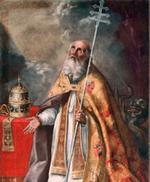Fathers of the Church
Epistle LV: to Fantinus, Guardian, of Panormus
by Gregory the Great in 590-604 | translated by James Barmby, D.d
Gregory to Fantinus, &c.
A little time ago we wrote to Victor, our brother and fellow-bishop, that—inasmuch as certain of the Jews have complained in a petition presented to us that synagogues with their guest-chambers, situated in the city of Panormus, had by him been unreasonably taken possession of—he should keep aloof from their congregation until it could be ascertained whether this thing had been justly done, lest perchance injury should appear to have been alleged by them of their own mere will. And indeed, having regard to his priestly office, we could not easily believe that our aforesaid brother had done anything unsuitably. But, since we find from the report of Salarius, our notary, who was afterwards there, that there had been no reasonable cause for taking possession of those synagogues, and that they had been unadvisedly and rashly consecrated, we therefore enjoin thy Experience, since what has been once consecrated cannot any more be restored to the Jews, that it be thy care to see that our aforesaid brother and fellow-bishop pay the price at which our sons, the glorious Venantius the Patrician, and Urbicus the Abbot, may value the synagogues themselves with the guest-chambers that are under them or annexed to their walls, and the gardens thereto adjoining; that so what be has caused to be taken possession of may belong to the Church, and they may in no wise be oppressed, or suffer any injustice. Moreover, let books or ornaments that have been abstracted be in like manner sought for. And, if any have been manifestly taken away, we desire them also to be restored without any ambiguity. For, as there ought to be no licence for them, as we have ourselves already written, to do anything in their synagogues beyond what is decreed by law, so neither damage nor any cost ought to be brought upon them contrary to justice and equity.
Taken from "The Early Church Fathers and Other Works" originally published by Wm. B. Eerdmans Pub. Co. in English in Edinburgh, Scotland, beginning in 1867. (LNPF II/XIII, Schaff and Wace). The digital version is by The Electronic Bible Society, P.O. Box 701356, Dallas, TX 75370, 214-407-WORD.






